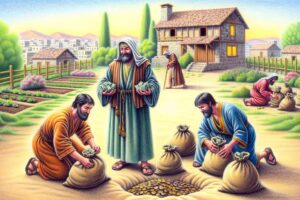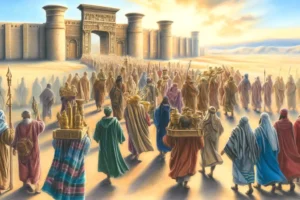
Solomon: King of Wisdom and Folly
Solomon, the son of David and King of Israel, is celebrated for his extraordinary wisdom, monumental achievements in temple building, and the profound cultural impact he had across various religious traditions.
Short Quick Facts about Solomon
- Reign and Kingdom: Solomon reigned as the third king of the United Kingdom of Israel following his father, David. His reign is often noted for its prosperity and the consolidation of his kingdom.
- Wisdom: Solomon is renowned for his wisdom, granted by God in response to his request for an understanding heart to judge his people fairly.
- Temple Construction: One of Solomon’s most significant accomplishments was building the First Temple in Jerusalem, which became the central place of worship for the Israelites.
- Literary Contributions: Traditionally, Solomon is credited with authoring several biblical texts, including Proverbs, Ecclesiastes, and the Song of Solomon.
- Wealth and Splendor: His reign was marked by unprecedented wealth and splendor, with extensive building projects and trade expansions.
- Diplomatic Relations: Solomon formed alliances through marriage with numerous foreign princesses and maintained peace in his region.
- Divine Judgment: Despite his wisdom, Solomon’s later years were marked by idolatry influenced by his foreign wives, leading to divine disapproval and the prophecy of the kingdom’s division.
- Cultural Impact: Solomon’s legendary wisdom and wealth have made him a seminal figure in Jewish, Christian, and Islamic traditions.
Historical Context and Early Life Solomon, the son of King David and Bathsheba, ascended to the throne of Israel around the 10th century BCE. His succession was not without controversy, involving court intrigue and familial strife, particularly with his older brother Adonijah. Solomon’s rise to power was solidified by his father’s choice and the prophet Nathan’s support.
Wisdom and Governance The early part of Solomon’s reign is most famous for his prayer for wisdom, which he chose over riches or long life. This decision pleased God, who granted him not only wisdom but also wealth and honor unprecedented among kings. Solomon’s wisdom is exemplified by the famous judgment between two women claiming the same baby (1 Kings 3:16-28), showcasing his insightful and discerning nature. His governance also saw the expansion of trade, military strength, and political alliances, primarily through marriages to foreign princesses, which later had spiritual repercussions.
Architectural and Cultural Contributions Solomon’s reign is notably marked by extensive building projects, the most significant being the construction of the First Temple in Jerusalem. This temple became the spiritual center for the Jewish people and a symbol of God’s presence among them. He also built a magnificent palace for himself and various fortifications and cities to bolster Israel’s infrastructure and defense. These projects required high taxes and forced labor, leading to unrest among his subjects.
Literary Contributions Solomon is traditionally credited with contributing to several biblical texts:
- Proverbs: A collection of wise sayings that offer insights into human nature and morality.
- Ecclesiastes: A philosophical reflection on the meaning of life and the vanity of worldly pursuits.
- Song of Solomon: A lyrical poem celebrating love, which has been interpreted both literally and allegorically within religious traditions.
Religious Failings and Legacy Despite his wisdom, Solomon’s later years were marked by significant moral and spiritual failings. His numerous marriages to foreign women led him to tolerate and even partake in idolatrous practices, which were against the teachings he knew and promoted. This apostasy angered God, who prophesied the division of his kingdom after his death. Indeed, following Solomon’s passing, his kingdom split into the northern kingdom of Israel and the southern kingdom of Judah.
Theological Insights Solomon’s story serves as a complex narrative about the blessings of divine wisdom, the dangers of wealth and power, and the spiritual peril of turning away from God’s commands. His life illustrates the principle that even the wisest among humans can fall prey to sin and that God’s gifts can be misused if not anchored in a steadfast faith.
Summary Solomon remains a figure of immense interest not only for his historical and biblical significance but also for his embodiment of the paradoxes of human capability. He was a man who could speak to the nature of the heavens but struggled with the nature of his own heart—a reminder of the perpetual human struggle between wisdom and folly.



